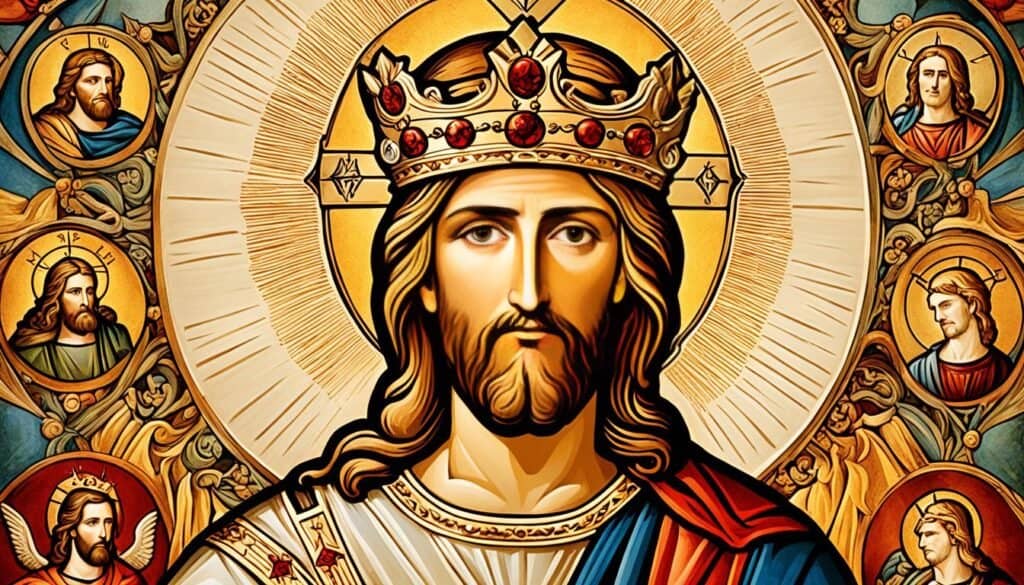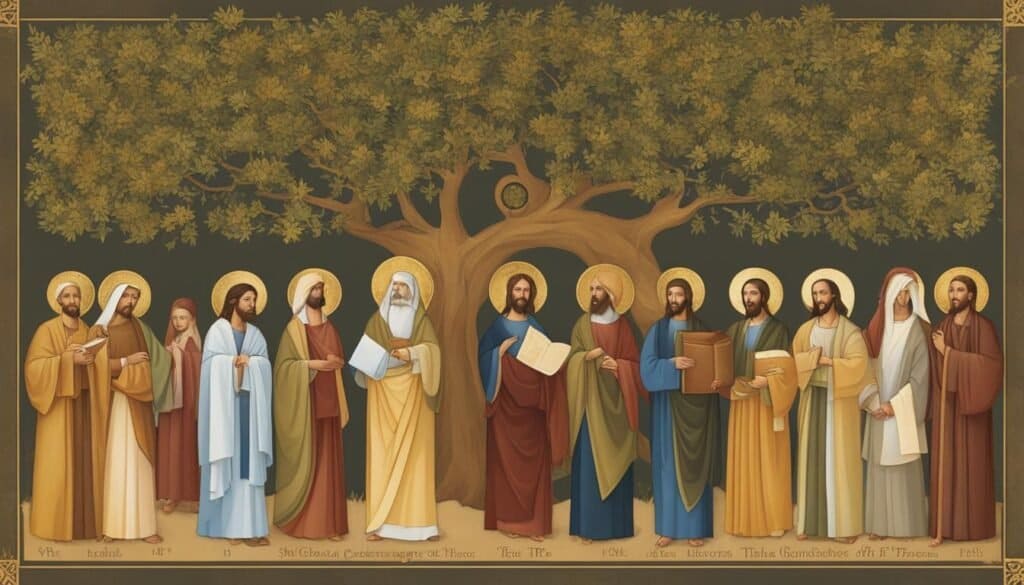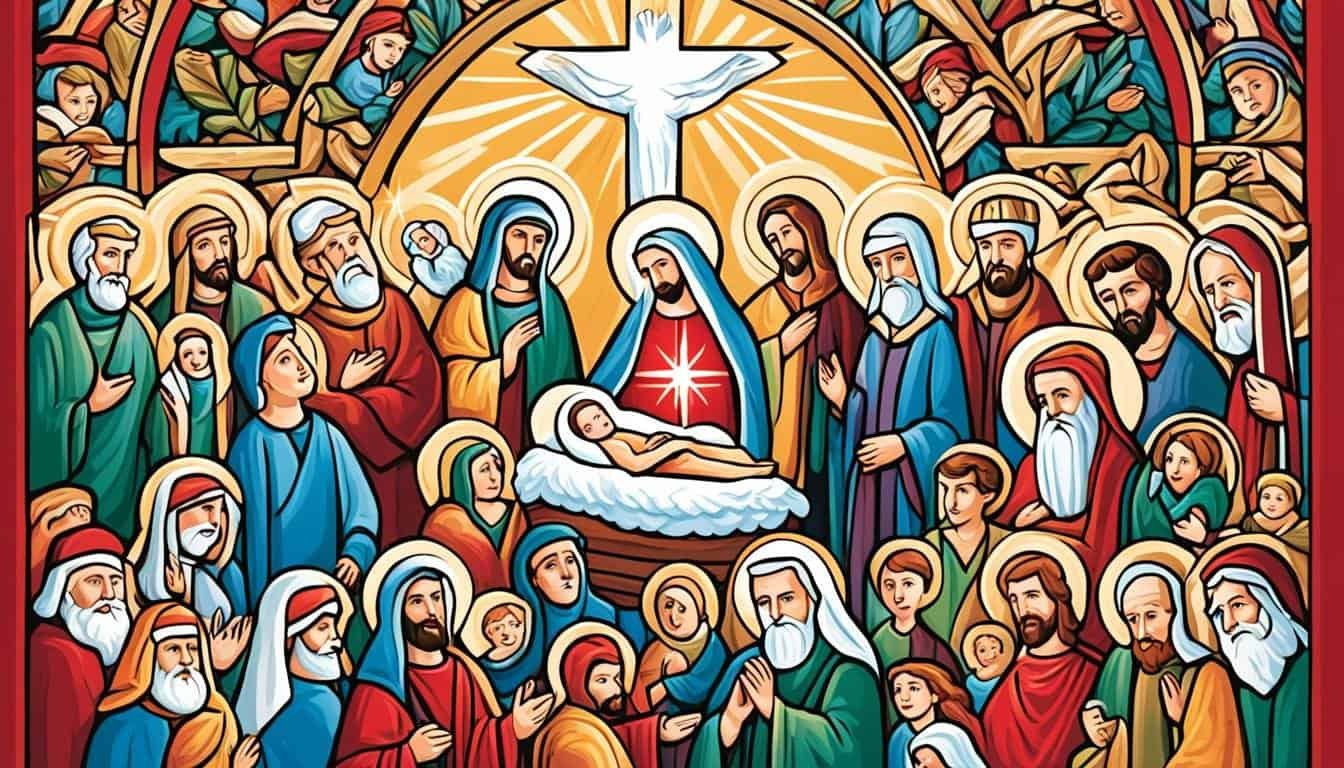Have you ever wondered why Jesus’ genealogy is so significant? What if I told you that within his family tree lies the fulfillment of prophecy and the faithfulness of God? Dive with us into the profound meanings and promises woven into Jesus’ Genealogy in Matthew, and discover the divine tapestry that connects the Old Testament with the arrival of the Messiah.
Bulletpoints
- Jesus’ genealogy confirms the messianic prophecies, showcasing the faithfulness of God.
- His lineage connects him to Abraham, fulfilling the promise of blessing all nations.
- By linking to King David, Jesus establishes his rightful claim to the throne.
- God’s meticulous design is revealed through the unfolding of Jesus’ genealogy.
- Unexpected ancestors like Rahab and Ruth demonstrate God’s grace and inclusivity.
Jesus as the Promised Seed: Connecting to Abraham
Jesus’ genealogy in Matthew establishes a vital connection to the patriarch Abraham, reinforcing his position as the promised seed through whom all nations would be blessed. This fulfillment of Genesis 12:3 underscores the significance of Jesus’ lineage and the universal impact of his mission.
Abraham, known as the father of faith, received a divine promise from God. Genesis 12:3 states, “And in you, all the families of the earth shall be blessed.” This promise was ultimately fulfilled in Jesus, who descended from Abraham in a direct lineage.
“And in you, all the families of the earth shall be blessed.”
The significance of this promise lies in its inclusive nature. Jesus’ genealogy shows that God’s plan of blessing extends to all nations, transcending boundaries of ethnicity, culture, and geography. Through Jesus, the blessings of redemption, forgiveness, and eternal life are made available to everyone, regardless of their background.
By connecting Jesus’ genealogy to Abraham, Matthew highlights the continuity of God’s redemptive plan throughout history. It demonstrates God’s faithfulness to His promises and His unwavering commitment to bless all nations through the Messiah.
The Universal Blessing: Fulfillment of Genesis 12:3
Jesus’ genealogy serves as a powerful testimony to the fulfillment of Genesis 12:3. Through his birth, life, death, and resurrection, Jesus becomes the vehicle through which all nations receive the blessings of salvation and reconciliation with God.
As we trace Jesus’ lineage in Matthew, we witness the unfolding of God’s plan to bless the entire world. The diverse array of ancestors in Jesus’ genealogy points to the inclusivity and universality of God’s redemptive work.
This image visually represents the genealogical connection between Jesus and Abraham, reminding us of the divine plan to bless all nations through Jesus’ lineage.
The fulfillment of Genesis 12:3 through Jesus’ genealogy is a powerful testament to God’s all-encompassing love, mercy, and grace. It reminds us that in Christ, we are all partakers of the promised blessings and heirs of the eternal Kingdom.
Affirming Jesus’ Royal Lineage: The Link to King David
In examining Jesus’ genealogy, we find a crucial link to King David, solidifying his royal lineage and rightful claim to the throne. This connection is of immense significance, as it fulfills the prophecies set forth in 2 Samuel 7:12-16.
“When your days are fulfilled and you lie down with your fathers, I will raise up your offspring after you, who shall come from your body, and I will establish his kingdom. He shall build a house for my name, and I will establish the throne of his kingdom forever. I will be to him a father, and he shall be to me a son. When he commits iniquity, I will discipline him with the rod of men, with the stripes of the sons of men, but my steadfast love will not depart from him, as I took it from Saul, whom I put away from before you. And your house and your kingdom shall be made sure forever before me. Your throne shall be established forever.”
This divine promise made to King David now finds fulfillment in the person of Jesus Christ, reinforcing his rightful claim to the throne. Through his lineage, Jesus not only possesses royal blood but also inherits the covenantal blessings conferred upon David’s house.
To visually comprehend the royal lineage of Jesus and the link to King David, let us explore the following table:
| Generations | Names |
|---|---|
| 1st | David (King of Israel) |
| 2nd | Solomon |
| 3rd | Rehoboam |
| 4th | Abijah |
| 5th | Asa |
| 6th | Jehoshaphat |
| 7th | Joram |
| 8th | Uzziah |
| 9th | Jotham |
| 10th | Ahaz |
| 11th | Hezekiah |
| 12th | Manasseh |
| 13th | Amon |
| 14th | Josiah |
| 15th | Jechoniah |
| 16th | Shealtiel |
| 17th | Zerubbabel |
| 18th | Abiud |
| 19th | Eliakim |
| 20th | Azor |
| 21st | Zadok |
| 22nd | Akim |
| 23rd | Eliud |
| 24th | Eleazar |
| 25th | Matthan |
| 26th | Jacob |
| 27th | Joseph (Husband of Mary) |
| 28th | Jesus (Son of Mary) |
Reflecting upon this royal lineage, we witness God’s faithful fulfillment of the promise made to King David. Jesus emerges as the ultimate heir, ushering in a new era where his everlasting kingdom will be established.

God’s Sovereign Plan Unfolded: Revealing His Meticulous Design
Through Jesus’ genealogy, we witness the meticulous unfolding of God’s redemptive plan from Genesis to the Gospels, magnificently showcasing His sovereign control over the course of history. Every name, every generation, and every detail in Jesus’ lineage serve as a testament to the providence and purpose of God.
From the very beginning, in the book of Genesis, we see glimpses of God’s sovereign plan for redemption. Each person in Jesus’ genealogy played a crucial role in the unfolding of this divine plan, whether they were aware of it or not. From Adam to Abraham, from David to Joseph, God orchestrated the intricate tapestry of human history to culminate in the birth of His Son, Jesus Christ.
“For my thoughts are not your thoughts, neither are your ways my ways,” declares the Lord. “As the heavens are higher than the earth, so are my ways higher than your ways and my thoughts than your thoughts.” – Isaiah 55:8-9
Time and time again, we witness how God worked through imperfect individuals and unlikely circumstances to bring about His sovereign plan. Despite the presence of sin and the brokenness of humanity, God’s plan remained steadfast. Through Jesus’ genealogy, we discover that God’s redemption was not a spontaneous event but a meticulously designed tapestry woven through the lives of ordinary men and women.
In the opening chapters of the Bible, we see humanity’s fall into sin. But even in the midst of this darkness, God revealed His redemptive purpose. He promised Adam and Eve that the Seed of the woman would crush the serpent’s head, offering hope in the midst of the curse. From that moment on, God’s plan to restore humanity and reconcile them to Himself began to unfold.
Throughout the Old Testament, we see glimpses of God’s redemptive plan through the lives of key figures like Noah, Abraham, Moses, and David. Each step, each promise, and each covenant served as building blocks in the unfolding drama of God’s salvation. From the establishment of the covenant with Abraham to the anointing of David as king, God’s plan moved forward, leading ultimately to the birth of Jesus.
This image beautifully represents the unfolding of redemption, symbolizing the interconnection of narratives from Genesis to the Gospels. As we trace the lineage of Jesus, we witness the tapestry of God’s grace and faithfulness, woven through generations, cultures, and historical events.
From the familiar stories of Abraham and David to the lesser-known individuals in Jesus’ genealogy, such as Tamar, Rahab, and Ruth, we see that God’s sovereign plan encompasses all peoples and backgrounds. These unexpected ancestors reveal God’s inclusive love, extending grace and redemption to the outsider, the marginalized, and the overlooked.
Key Takeaways
- Jesus’ genealogy displays God’s sovereign control over history, showcasing His meticulous design and unwavering faithfulness.
- From Genesis to the Gospels, God’s redemptive plan unfolds, affirming His purpose to restore humanity and reconcile them to Himself.
- Despite human imperfections, God’s plan remains unwavering and unfolds through ordinary men and women.
- Jesus’ genealogy bridges the gap between the Old and New Testaments, revealing the continuity and integrity of God’s plan throughout Scripture.
Grace through Unexpected Ancestors: Extending Inclusivity and Redemption
In exploring Jesus’ genealogy, we find a remarkable demonstration of God’s grace. Not only does it trace the royal lineage of Jesus, but it also includes unexpected individuals whose stories highlight God’s inclusivity and redemption for all. Two notable women in Jesus’ lineage are Rahab and Ruth.
Rahab: A Woman of Courage and Faith
Rahab, mentioned in Matthew 1:5, was a Canaanite woman who played a crucial role in the Israelites’ conquest of Jericho. Despite her ancestry, Rahab demonstrated remarkable faith in God and risked her life to protect the Israelite spies. In return for her actions, Rahab and her family were saved from the destruction of the city.
“By faith Rahab the prostitute did not perish with those who were disobedient because she had given a friendly welcome to the spies” (Hebrews 11:31).
Rahab’s inclusion in Jesus’ genealogy showcases God’s willingness to extend His grace beyond cultural boundaries, embracing individuals from any background who place their trust in Him.
Ruth: A Story of Loyalty and Redemption
Ruth, a Moabite woman mentioned in Matthew 1:5, demonstrated great loyalty and devotion. After her husband’s death, she chose to remain with her mother-in-law, Naomi, and journey to Bethlehem. Through divine providence, Ruth’s life intersected with Boaz, a member of the Israelite community, resulting in their marriage.
“For where you go I will go, and where you lodge I will lodge. Your people shall be my people, and your God my God” (Ruth 1:16).
Ruth’s inclusion in Jesus’ genealogy underscores God’s redemptive plan. Her story serves as a powerful reminder that God is not limited by societal norms or cultural barriers; instead, He embraces those who demonstrate faithfulness and seek Him wholeheartedly.
Visualizing the Unexpected: Rahab and Ruth in Jesus’ Genealogy
To visually comprehend the unexpected presence of Rahab and Ruth in Jesus’ genealogy, let’s explore the table below:
| Name | Background | Significance |
|---|---|---|
| Rahab | Canaanite woman | Demonstrates God’s grace and inclusivity |
| Ruth | Moabite woman | Illustrates God’s redemption and loyalty |
This table highlights how God’s grace extends beyond expectations, embracing individuals from diverse backgrounds and showcasing His redemptive plan in unexpected ways.
Next, let’s explore how Jesus’ genealogy fulfills the legal requirements and aligns with Jewish customs and laws.
Fulfilling the Legal Requirements: Jesus’ Genealogy and Jewish Customs
Jesus’ genealogy through Joseph serves to fulfill the legal heritage required for messiahship according to Jewish customs and laws. By tracing Jesus’ lineage, we find that he is a descendant of King David and Abraham, aligning with the prophecies that foretold the coming of the Messiah.
In Matthew 1:1-17, we see the meticulous documentation of Jesus’ genealogy, emphasizing his connection to the royal lineage of King David. This lineage is crucial in establishing Jesus’ rightful claim to the throne and validating his messianic identity. The thorough adherence to Jewish customs and laws in recording and preserving this genealogy significantly adds credibility to Jesus’ lineage.
“And Jacob begot Joseph the husband of Mary, of whom was born Jesus who is called Christ.” – Matthew 1:16
Through Joseph, Jesus fulfills the legal requirements for messiahship within the Jewish faith. This continuity with Jewish customs and laws demonstrates the significance of Jesus’ genealogy, giving weight to his claims as the promised Messiah.
In addition to fulfilling legal heritage, Jesus’ genealogy also connects him to the broader narrative of salvation history. It magnifies the faithfulness and sovereignty of God, as every generation and individual in his lineage played a unique role in preparing the way for the Savior of the world.
Jesus’ Genealogy through Joseph
The genealogy in Matthew traces Jesus’ lineage back to Abraham, illustrating his connection to the promises made to the father of Israel. This connection echoes the words in Genesis 22:18: “And all the nations of the earth shall be blessed in your offspring.” Through Jesus, the fulfillment of this promise extends to all nations, demonstrating the inclusive nature of God’s plan of redemption.
Moreover, Jesus’ lineage through Joseph also fulfills the prophecy in Jeremiah 23:5: “Behold, the days are coming, declares the Lord, when I will raise up for David a righteous Branch, and he shall reign as king and deal wisely, and shall execute justice and righteousness in the land.” Jesus’ direct descent from David further affirms his rightful claim to the throne, confirming his purpose as the Messiah-King.
Fulfilling Legal Heritage
As per Jewish customs and laws, the preservation and documentation of genealogical records were of utmost importance. These records would establish one’s lineage, enabling the individual to claim any rights or fulfill any obligations pertaining to their heritage. In Jesus’ case, an accurate genealogy was crucial in proving his eligibility for the messianic role.
By adhering to the legal requirements and aligning with Jewish customs, Jesus fulfills the expectations set forth by the religious authorities and the Jewish community. This fulfillment not only provides evidence of Jesus’ identity as the promised Messiah but also ensures his acceptance and recognition among the Jewish people.
Jewish Customs and Laws
Jewish customs and laws played a significant role in shaping the social and religious structure of the ancient Jewish community. These customs included practices such as circumcision, observance of the Sabbath, and adherence to dietary laws, among others.
The meticulous attention to Jewish customs and laws in Jesus’ genealogy highlights the importance of upholding these traditions within the lineage of the promised Messiah. It demonstrates Jesus’ commitment to the religious and cultural heritage of his people, cementing his place within the Jewish community and reinforcing his role as the fulfillment of prophecy.
Furthermore, Jesus’ adherence to Jewish customs and laws serves as an example for his followers, emphasizing the continuity between the Old and New Testaments and the significance of the Jewish heritage in understanding the faith.
| Key Points | Explanation |
|---|---|
| Fulfillment of Legal Requirements | Jesus’ genealogy through Joseph satisfies the legal heritage required for messiahship. |
| Alignment with Jewish Customs | Jesus’ genealogy adheres to the religious and cultural practices of the Jewish community, adding credibility to his lineage. |
| Meticulous Documentation | The thorough recording of Jesus’ genealogy highlights its importance and ensures its authenticity. |

God’s Active Involvement in History: Demonstrating His Control
Jesus’ genealogy serves as a remarkable testament to God’s active involvement in guiding history towards the arrival of the Messiah. It showcases the sovereignty and providence of our Heavenly Father, who holds complete control over the course of human events.
“For I am God, and there is no other; I am God, and there is none like me, declaring the end from the beginning and from ancient times things not yet done, saying, ‘My counsel shall stand, and I will accomplish all my purpose.'” – Isaiah 46:9-10
Throughout the generations, God carefully orchestrated the lineage of Jesus, ensuring that every detail aligned with His divine plan. From Abraham to King David, and from the Babylonian exile to the birth of Christ, each milestone in history played a crucial role in bringing forth the promised Messiah.
As believers, we can find solace and reassurance in knowing that our God is not distant or indifferent to our world. Instead, His hand is intimately woven into the fabric of time and space, shaping events and fulfilling His redemptive purposes.
Just as it was prophesied in Micah 5:2, even the birthplace of Jesus was predetermined by God:
“But you, O Bethlehem Ephrathah, who are too little to be among the clans of Judah, from you shall come forth for me one who is to be ruler in Israel, whose coming forth is from of old, from ancient days.” – Micah 5:2

Through Jesus’ genealogy, we are reminded that history is not a mere sequence of random events, but a purposeful tapestry directed by a loving God. Every triumph and every trial, every victory and every setback, all work together in harmony to accomplish His divine will.
In the table below, we can observe the generations leading up to the birth of Jesus, serving as a testament to God’s meticulous orchestration of history:
| Generation | Ancestors |
|---|---|
| 1 | Abraham |
| 2 | Isaac |
| 3 | Jacob |
| 4 | Judah and his brothers |
| 5 | Perez and Zerah (from Tamar) |
| 6 | Hezron |
| 7 | Ram |
| 8 | Amminadab |
| 9 | Nahshon |
| 10 | Salmon |
| 11 | Boaz (from Rahab) |
| 12 | Obed (from Ruth) |
| 13 | Jesse |
| 14 | King David |
| 15 | Joseph (husband of Mary) |
| 16 | Jesus |
As we reflect upon this genealogy, we are reminded of God’s sovereignty over every aspect of history. From the selection of Abraham and the establishment of the Davidic dynasty, to the arrival of Jesus as the fulfillment of Messianic prophecy, God’s hand is evident at every turn.
Indeed, Jesus’ genealogy is a powerful testament to the truth that throughout the ages, God has been actively involved in guiding and shaping the course of history, always working towards the fulfillment of His redemptive plan.
Encouraging Faith in God’s Promises: Fulfilled in Jesus’ Genealogy
In tracing Jesus’ genealogy, we discover a powerful testament to God’s faithfulness in fulfilling His promises. The lineage of Jesus serves as a living testament to the enduring nature of God’s word and His unwavering commitment to His people.
Throughout the generations, God made promises to His chosen people, assuring them of His steadfast love and provision. In Jesus’ genealogy, we witness the fulfillment of these promises, reinforcing our faith in God’s faithfulness.
“For all the promises of God find their Yes in him. That is why it is through him that we utter our Amen to God for his glory.” – 2 Corinthians 1:20
As we examine the names within Jesus’ genealogy, we encounter stories of triumph, redemption, and even unexpected individuals who played significant roles in God’s plan. From the faithfulness of Abraham to the anointing of King David, each generation reveals God’s meticulous orchestration of history.
Moreover, in studying the genealogy of Jesus, we find assurance that God will fulfill His promises, even when circumstances seem improbable or delay seems prolonged. The unfolding of Jesus’ genealogy demonstrates that God’s timing is perfect, and His faithfulness endures throughout the ages.
“And we know that for those who love God all things work together for good, for those who are called according to his purpose.” – Romans 8:28
In our journey of faith, we may encounter doubts, challenges, and moments of uncertainty. But when we delve into the genealogy of Jesus, we are reminded of the unshakable promise of God’s faithfulness. This knowledge encourages us to trust in Him, to believe that He is working all things together for our good.
Like the generations before us, we can take comfort in knowing that God’s promises are not empty words. They are seeds of hope that bear fruit in due time. The fulfillment of these promises in Jesus’ genealogy encourages us to hold fast to our faith, knowing that God is faithful to complete what He has promised.
“Let us hold fast the confession of our hope without wavering, for he who promised is faithful.” – Hebrews 10:23
As we reflect on Jesus’ genealogy, let us be inspired by the legacy of faith that has been passed down to us. May we be encouraged by the stories of the faithful who have gone before us, trusting in God’s faithfulness and the fulfillment of His promises.
Through Jesus’ genealogy, we are invited to embrace a deeper faith, one that finds strength in the belief that God remains true to His word. Let us hold fast to this truth, knowing that in every season of life, God’s faithfulness will sustain us and guide us on our journey of purpose and fulfillment.
| Key Points |
|---|
| Jesus’ genealogy serves as a testament to God’s faithfulness in fulfilling His promises. |
| Each generation in Jesus’ genealogy reveals God’s meticulous orchestration of history. |
| Studying Jesus’ genealogy reinforces our trust in God’s faithfulness. |
| Jesus’ genealogy encourages us to hold fast to our faith, knowing that God is faithful to fulfill His promises. |

Validating the Old and New Testaments: Bridging Continuity and Integrity
Jesus’ genealogy plays a crucial role in validating the continuity and integrity of the Bible, serving as a bridge between the Old and New Testaments. The genealogical records presented in Matthew provide a tangible link between the prophecies and promises of the Old Testament and their fulfillment through Jesus in the New Testament. This validation affirms the trustworthiness and reliability of the Scriptures, showcasing the divine orchestration of history.
“For truly, I say to you, until heaven and earth pass away, not an iota, not a dot, will pass from the Law until all is accomplished.” – Matthew 5:18
By tracing Jesus’ lineage back to King David and Abraham, the genealogical records not only establish his rightful claim to the throne but also fulfill the prophecies foretold throughout the Old Testament. This continuity reassures believers that God’s plan of redemption has been carefully unfolding since the beginning, with every detail meticulously orchestrated to culminate in the arrival of the Messiah.
Validating the New Testament
The genealogy of Jesus serves as a vital piece of evidence validating the New Testament accounts of his life, ministry, death, and resurrection. It provides historical and genealogical links, solidifying the credibility and accuracy of the Gospel narratives. Through the genealogy, we can connect the dots between the Old Testament prophecies and their fulfillment in Jesus, reinforcing the truth of his divine identity and purpose on earth.
This validation not only strengthens our faith in the New Testament but also deepens our understanding of the Old Testament. It highlights the interconnectedness of Scripture and underscores the divine authorship behind its composition.
Bridging Continuity and Integrity
Jesus’ genealogy is more than a mere list of names; it is a testament to the continuity and integrity of God’s Word. It showcases the faithfulness of God to fulfill His promises and reveals His active involvement in human history. The genealogical records provide a solid foundation for our trust in Scripture, affirming that God’s hand is at work in every page, from Genesis to Revelation.
Figure: Visual representation of the genealogical records illustrating the continuity and integrity of the Bible.
Are the Blessings of Jesus’ Genealogy in Matthew Connected to the Themes of Hope, Transformation, and Unconditional Love in Romans?
Matthew’s genealogy of Jesus demonstrates God’s unconditional love by tracing Jesus’ lineage through flawed individuals, showing that God works through imperfect people. This genealogy connects to the themes of hope and transformation in Romans, as it reveals God’s redemptive power and His ability to bring about change in people’s lives.
Inspiring Hope for the Future: Jesus’ Genealogy and Everlasting Kingship
Jesus’ genealogy serves as a powerful reminder of the promise of eternal kingship that he brings. As we trace his lineage from Abraham to King David, we see the fulfillment of ancient prophecies and the establishment of the everlasting kingdom.
Through Jesus, hope is ignited within our hearts. We find solace in the knowledge that his reign knows no end and his sovereignty is eternal. This promise inspires us to hold on to our faith, knowing that in Jesus, we have a king who will never falter or waver.
In a world filled with uncertainty and fleeting kingdoms, the assurance of Jesus’ everlasting kingship brings us comfort and peace. It reminds us that no matter the trials we face or the hardships we encounter, there is a greater kingdom awaiting us, where justice and righteousness will reign supreme.
So let us cling to this promise, drawing strength from Jesus’ genealogy and the hope it offers. Amidst the challenges of life, may we find encouragement in the knowledge that we serve a king who is unshakable, and that his everlasting kingdom is our ultimate destination.
Affiliate Disclosure: "As an Amazon Associate I earn from qualifying purchases made from links in this post. We are a participant in the Amazon Services LLC Associates Program, an affiliate advertising program designed to provide a means for us to earn fees by linking to Amazon.com."

